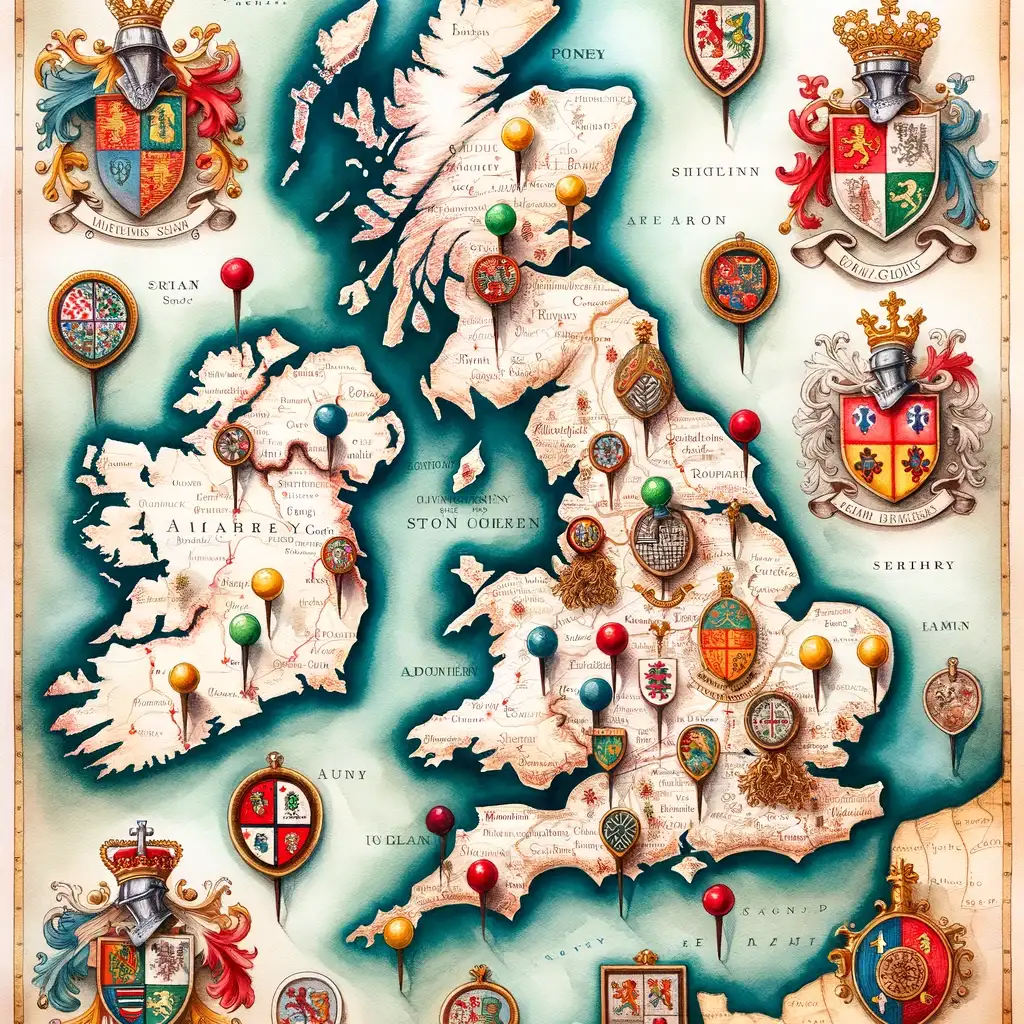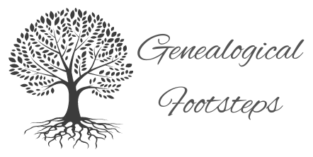The Guild of One-Name Studies is an international organisation dedicated to surname studies and genealogy research. Members of the guild focus on preserving family history by researching and documenting the origins and variations of surnames around the world.
By participating in the Guild of One-Name Studies, individuals have access to a wealth of family history resources and can connect with fellow researchers to collaborate on surname studies. Understanding the guild and its purpose can greatly enhance one’s genealogical research and contribute to the preservation of ancestral knowledge.
Key Takeaways:
- The Guild is an international organisation focused on surname studies and genealogy research.
- Members have access to a wealth of family history resources, including the Journal of One-Name Studies and an Annual Conference.
- The Guild emphasises the importance of understanding surname variations for genealogical research.
- Genetic genealogy is a significant tool used by Guild members to map out surname variations and discover ancestral connections.
- Membership comes with responsibilities and requirements, including participation in Guild Projects like Marriage Challenges.
- Ethical considerations, such as informed consent and data privacy, are crucial in genealogical research involving DNA testing.
- Active participation in the Guild’s activities, like sharing research findings and volunteering, enhances the collective understanding of surname history.
What is the Guild of One-Name Studies?
The Guild of One-Name Studies is a non-profit organisation that focuses on surname studies in genealogical research. Its members are passionate about preserving family history and investigating the origins, variations, and distribution of surnames. The Guild offers a community for individuals who want to collaborate and share their research, knowledge, and experience with like-minded people.
The Guild of One-Name Studies believes that each surname is unique and valuable to the study of genealogy. Members of the Guild strive to create surname databases that are accessible and organised, making it easier for individuals to research their family history. The Guild encourages members to participate in surname studies that can uncover new connections and create a more comprehensive understanding of surname history.
The study of surname variations is also a significant aspect of the Guild’s work. Members recognise that spelling and pronunciation of surnames change over time, and understanding these variations can provide valuable insights into family connections and migration patterns. Genetic genealogy is an essential tool used by members of the Guild to help map out these variations and discover ancestral connections.
Guild Membership Benefits and Requirements
Joining the Guild of One-Name Studies comes with a plethora of benefits designed to aid members in their genealogical research and networking. One of the most valuable resources is the Journal of One-Name Studies, a quarterly publication filled with news, articles, and innovative ideas in the field of surname studies. Members also gain access to an Annual Conference and other Seminars, which are held in various parts of Britain and feature speakers specialised in one-name studies.
The Guild offers Regional Representatives in most counties of the UK and in various worldwide locations. These representatives sometimes hold local meetings where members can discuss their studies and share experiences. Members are also entitled to Guild Publications, including a Members’ Handbook that provides an overview of the Guild’s functions and guidelines. The Guild Forum serves as a worldwide email discussion group where members can learn from each other and share their experiences.
In terms of online resources, members have access to the Members’ Room, a private area on the Guild’s website filled with helpful resources, including the Guild Knowledge Store, a Wiki where you can both learn about and contribute to information on one-name study techniques. The Guild also provides email aliases that remain the same as long as you are a member, even if you change your Internet Service Provider. Members also enjoy discounts on specialist books, computer products, and some data providers’ subscription or pay-per-view websites.
Requirements and Fees
Membership in the Guild is not just about benefits; there are also responsibilities and requirements. It is essential to know that registering a surname with the Guild opens the door to additional benefits like participation in Guild Projects such as Marriage Challenges and access to various indexes and archives. Insofar as fees are concerned, for individuals joining the Guild there is a sliding scale of prices. These depend on the month of joining, but they offer up to twenty-three months of membership for a single joining fee. At the time of this writing, membership without a study registration were running at £34.50 for 23 months, while membership with a study registration is £48.50 for the same period of time.
Additional Perks
If you register a surname, you can also benefit from Guild Projects like the Marriage Challenges, which is a co-operative project to obtain details of post-1837 England & Wales Marriages. There’s also the Guild Marriage Index and Guild Probate Index, facilities that help members find names of marriage partners and index various names mentioned in Wills, respectively. These tools are invaluable for anyone deeply involved in genealogical research.
By becoming a member, you not only gain access to these resources, but you also become part of a community dedicated to the rigorous and ethical study of surnames, contributing to the broader field of genealogy.

Exploring Surname Origins: A Methodological Deep Dive
Tracing the origins of a surname can provide a fascinating glimpse into one’s family history. Genealogy research is the key to uncovering the stories behind family names and discovering hidden links between generations. There are various ways to explore the origins of surnames, and many family history resources are available for those who wish to delve deeper into their past.
Etymology and Linguistic Roots
One of the most common methods of tracing surname origins is through etymology. By examining the linguistic roots and history of a name, researchers can gain valuable insights into its origins and meaning. Family history resources such as language dictionaries, surname books, and online databases can be especially useful in this regard.
Historical Records and Primary Sources
Another method involves the use of historical records and primary sources like birth, marriage, and death certificates, as well as census data and parish records. These documents can offer clues about the geographical distribution of a surname at different points in time, as well as its socio-economic context. Academic history journals often publish articles that delve into the methodologies of using primary sources for surname research.
Genetic Genealogy
Genetic genealogy has become increasingly popular as a method for tracing surname origins. By analysing specific markers in DNA, researchers can identify potential relatives and ancestral origins. This method can be particularly useful for surnames that have undergone significant variations or for families that have migrated across large distances. A journal article titled Jewish Surname Changes (Sampling of Prague Birth Registries 1867–1918) discusses the role of genetic genealogy in tracing surname changes among Czech and Moravian Jews.
Computational Methods
With the advent of big data and computational tools, researchers are now using algorithms to analyse large datasets of surnames. These methods can identify patterns and trends that are not easily discernible through traditional research methods. For example, a research article discusses a method to identify the national heritage of authors based on the morphology of their surnames.
Cultural and Social Context
Understanding the cultural and social context in which a surname originated can also provide valuable insights. This involves studying historical texts, cultural practices, and even folklore associated with a surname. Such an approach can offer a more nuanced understanding of the surname’s history.
The Importance of Genealogy Research
Genealogy research is far more than a hobby; it’s a rigorous academic discipline that requires a methodological approach. The study of family history and surname origins is deeply rooted in the examination of primary sources like birth, marriage, and death records, as well as census data and family trees. These primary sources serve as the bedrock of genealogical research, allowing researchers to construct a detailed narrative of their ancestry.
Best Practices in History Education and Genealogical Research
When it comes to best practices in history education, the emphasis is often on critical thinking, source evaluation, and contextual understanding. Similarly, in genealogical research, it’s crucial to:
- Evaluate Sources: Always consider the reliability of your sources. Primary sources are generally more reliable but can still contain biases or errors. Secondary sources should be cross-referenced for accuracy.
- Contextualise Information: Understanding the historical, social, and cultural context of the time and place your ancestors lived can provide invaluable insights into their lives.
- Cite Your Sources: Proper citation is not just academic rigor; it’s a courtesy to those who follow in your research footsteps. It allows others to verify your findings and further the field.
- Use Technology Wisely: Digital tools can be incredibly helpful but should be used judiciously. Software for family tree mapping, digital archives, and online forums can be beneficial but should be cross-referenced for accuracy.
The Historiography of Genealogy
The study of genealogy has evolved significantly over the years. Initially seen as a way to trace noble or royal bloodlines, it has democratised over time to become accessible to anyone interested in their family history. The advent of DNA testing has added a scientific layer to the field, allowing for genetic genealogy that can uncover previously unknown connections or even solve historical mysteries. However, this also brings ethical considerations into play, particularly concerning privacy and data usage.
DNA Testing: A Revolutionary Tool with Ethical Implications
DNA testing has revolutionised genealogical research by providing a scientific method to establish familial connections. However, it’s essential to approach it with ethical considerations in mind. Consent and data privacy are paramount, and researchers must be transparent about how the data will be used.
Family History Resources for Surname Research: Expanding Your Toolkit
The landscape of genealogical research has expanded to include a plethora of resources. Public records offices, libraries, and archives remain invaluable for primary data. In contrast, the digital age has ushered in online databases and genealogy websites as valuable secondary sources. Some of these are free, while others might require a subscription or membership fee, often providing access to more specialised data.
Staying Current: The Dynamic Nature of Genealogy Research
Genealogy is a continually evolving field, with new resources, methods, and technologies emerging regularly. Subscribing to academic journals focused on genealogy, participating in webinars, and joining genealogical societies can help researchers stay up-to-date.

Historical Context of Surnames
The concept of surnames has a rich and varied history that differs across cultures and time periods. In Europe, the practice of using surnames became popular during the Roman Empire and saw a resurgence in the late Middle Ages. These surnames often started as bynames, which indicated an individual’s occupation or area of residence. In China, the tradition of surnames dates back to at least the 2nd century BC. Initially, Chinese surnames were matrilineal but became patrilineal by the time of the Shang dynasty. In the Middle East, surnames have been of great importance since as early as 1800 BC, often denoting tribal affiliations or place of origin.
Cultural Variations and Modern Adaptations
Surnames have not only evolved within cultures but have also been adapted or replaced due to political pressures or migration. For example, during the era of the Trans-Atlantic slave trade, many Africans were forced to take on the surnames of their owners. In modern times, countries like the Netherlands, Japan, and Turkey have formally adopted the use of family names for administrative purposes. Even today, the use of surnames is not universal; for instance, Icelanders and many East African communities do not use family names.
The Study of Surnames
The study of surnames falls under the broader field of onomastics. In some cases, researchers conduct one-name studies, collecting vital and biographical data about all persons worldwide sharing a particular surname. Such studies offer valuable insights into the historical, social, and cultural contexts in which surnames have evolved.
The Significance of Surname Variations
Surname variations play a crucial role in genealogical research, providing valuable insights into familial connections and ancestry. The Guild of One-Name Studies recognises the importance of understanding and exploring surname variations in family history research.
Through extensive genealogy research, it has been discovered that surname variations can take various forms, including different spellings, phonetic versions, and regional variations. These variations can occur due to a variety of reasons, including transcription errors, dialectal differences, and changes made by individuals or families.
For genealogy researchers, exploring surname variations can lead to new discoveries and connections, even between seemingly unrelated individuals or families. By recognising and tracing these variations over time, researchers can gain a deeper understanding of the history of a particular surname and its significance in their family tree.
Fortunately, there are numerous family history resources available that can help genealogy researchers uncover these variations. Surname databases, parish records, and census data are just a few examples of resources that can provide insights into variations of a particular surname.
Examples of Surname Variations
| Surname | Variations |
|---|---|
| Smith | Smyth, Smithe, Smythe |
| Johnson | Johnston, Johnstone, Jonson |
| Williams | Williamson, Wiliams, Willams |
Utilising Family History Resources
The Guild of One-Name Studies provides access to a wealth of family history resources that genealogists can use for their research. These resources can help create a comprehensive and accurate family tree, with a focus on surname history and genealogical connections.
The Guild boasts an extensive surname database, which is particularly useful for surname studies. It contains millions of records of different surnames, from around the world, with a variety of spellings and variations. Members can search the database to find information about their family name, including its origins and distribution across different regions.
In addition to the database, the Guild offers access to other family history resources, such as archives, libraries, and genealogical societies. These resources provide a wealth of information that can help complete a family tree or uncover new avenues of research.
| Resource | Description |
|---|---|
| Surname Dictionaries | A list of published surname dictionaries, both historical and contemporary, which give in-depth information about different surnames |
| Family Trees | A collection of family trees of Guild members and other genealogists, which can help identify potential familial connections |
| Online Forums | A platform for members to discuss genealogy research and seek advice and information from fellow genealogists |
| One-Name Study Reports | A series of reports published by the Guild, which provide detailed information on specific surnames, including their origins, distribution, and notable individuals |
The family history resources provided by the Guild can greatly enhance genealogical research and help to create a comprehensive family tree. Members have access to a vast range of information, which can be used to trace family history back several generations.
Embracing Genetic Genealogy
In recent years, genetic genealogy has become a valuable tool for exploring family history. By examining an individual’s unique DNA profile, researchers can uncover ancestral connections and enhance their understanding of surname history. The Guild of One-Name Studies recognises the significance of genetic genealogy in surname studies and encourages members to embrace this growing field.
One of the primary benefits of genetic genealogy is its ability to identify familial connections that traditional genealogical research methods may overlook. By analysing DNA markers, researchers can determine the probability of relatedness between individuals with the same or similar surnames.
Additionally, genetic genealogy can provide insights into the migration patterns of ancestral families. By comparing DNA profiles of individuals with the same surname from different regions, researchers can track the movement of a surname over time and across geographical locations.
The Role of DNA Testing in Surname Studies
DNA testing is a valuable tool for surname studies because it can help identify connections between individuals who share the same or similar surnames. There are several types of DNA tests available, including autosomal DNA, Y-DNA, and mitochondrial DNA testing, each with its own unique benefits for genealogical research.
Autosomal DNA testing is the most common form of genetic testing and can reveal information about an individual’s ethnicity and ancestral connections within the past few generations. In contrast, Y-DNA testing analyses the Y chromosome, which is passed down from father to son and can provide insights into a surname’s paternal lineage. Mitochondrial DNA testing examines the maternal lineage and can reveal information about the maternal ancestors of an individual.
Ethical Considerations in Surname Studies
The world of genealogical research, particularly when it involves surname studies and DNA testing, is fraught with ethical considerations that researchers must navigate carefully. One of the most pressing issues is that of informed consent. When individuals submit their DNA samples to genealogical databases, they often do so with the understanding that their data will be used for genealogical research or to find potential relatives. However, there are instances where this data has been used for criminal investigations, as was the case in the arrest of the suspected Golden State Killer. The ethical dilemma arises when individuals are not explicitly informed that their data could be used for purposes other than what they initially consented to. This raises questions about the adequacy and transparency of consent forms and terms of service provided by genealogical services.
Another critical ethical concern is privacy and data security. While the law may not offer comprehensive protections, the ethical responsibility lies with the researchers and the platforms that store this sensitive information. The data not only has implications for the individual but also for their relatives and, in some cases, entire communities. There’s also the risk of data being used for discriminatory practices, such as employment or insurance discrimination. Given the sensitive nature of genetic data, it is imperative for researchers and genealogical services to implement robust security measures to protect this information. Furthermore, there should be clear guidelines and limitations on how this data can be used, especially in legal contexts.
Lastly, the issue of justice and fair representation cannot be ignored. Existing biases in forensic databases could lead to the disproportionate targeting of certain racial or ethnic groups. This is particularly concerning if law enforcement agencies use these databases to identify suspects based on racial or ethnic markers. Therefore, ethical guidelines should also address the fair and unbiased use of genealogical data in all contexts, including criminal investigations.
Enhancing Understanding of Surname History
By embracing genetic genealogy, members of the Guild of One-Name Studies can enhance their understanding of surname history. DNA testing can provide a deeper understanding of the origins and migrations of specific surnames, as well as reveal familial connections that would have otherwise gone unnoticed.
Furthermore, genetic genealogy can help solve genealogical mysteries and break down brick walls in family research. Even if traditional genealogical research methods have failed to identify a definitive connection between individuals with the same surname, DNA testing can provide the missing piece of the puzzle.

Mapping Surname Distribution
Mapping surname distribution is a useful tool in genealogy research. By identifying where a particular surname is most commonly found, researchers can gain insights into ancestral migration patterns and familial connections.
Family history resources such as census records, parish registers and newspaper archives can provide valuable data for creating surname distribution maps. With the help of geo-coding software, researchers can plot data points on digital maps to generate visual representations of surname distribution.
Surname mapping can also be used to identify clusters of individuals with the same surname, potentially indicating a shared ancestry. This data can then be cross-referenced with other genealogical research to build more comprehensive family trees and uncover new family connections.
Contributing to the Guild of One-Name Studies
To fully benefit from the Guild of One-Name Studies, participating in the organisation’s activities is vital. There are various ways to contribute to the guild and collaborate with fellow genealogy researchers.
One way to participate is by sharing research findings with other members. Members can share their expertise in particular surname studies, which aids in building a more comprehensive understanding of a surname’s history and variations. Volunteering is another way to be involved with the guild’s activities. Members who volunteer their time and skills assist the guild in achieving its goals further. Collaborating with other members can also be effective in uncovering crucial information about a surname’s past.
Connecting with Fellow Researchers
Connecting with fellow researchers is crucial to effective participation in the Guild of One-Name Studies. Networking allows members to share knowledge, ideas, and resources with each other. By participating in the guild’s activities, members can connect with other members in a more meaningful way. Members can get to know other genealogy researchers, learn from their expertise, and collaborate on future projects.
To benefit from the guild’s resources and the expertise of its members, it is crucial to engage actively in its activities. By sharing research findings, volunteering, and collaborating with other members, you can become an essential part of the guild’s efforts to preserve and understand family history through surname studies.
Building a Surname Database
A surname database is an essential resource for conducting successful genealogy research. By organising and centralising information about a specific surname, researchers can more easily identify familial connections, trace migration patterns, and uncover new leads for further exploration.
When building a surname database, it’s important to begin with a clear plan and methodology. This should include defining the scope of the project, determining which resources to utilise, and establishing a system for organising and storing data.
One useful resource for creating a surname database is the Guild of One-Name Studies. Membership in the guild provides access to a wealth of family history resources and a community of like-minded researchers to collaborate with and learn from.
Another valuable resource for building a surname database is online archives and databases, such as Ancestry.com or FamilySearch.org. These can provide a wealth of historical records, including census data, birth and death certificates, and immigration records.
When organising data in a surname database, it’s important to establish a consistent system for recording and categorising information. This may include creating separate entries for each individual with a given surname, noting important dates and locations, and including any additional relevant information, such as occupation or military service.
Technological Tools for Research
After you’ve built your surname database, the next step in your genealogical journey is to leverage the power of technology. Software and technological tools can significantly streamline your research process, making it easier to manage, analyse, and visualise complex family histories.
Genealogy Software
- Agelong Tree: This software is proprietary and available for Windows and macOS. It does not offer a free version but has a 40-person free trial.
- Ancestral Quest: This software is also proprietary but offers a basics version for free. It is compatible with Windows and macOS.
- Ancestris: This is a free and open-source software under the GNU GPL license. It is compatible with Windows, macOS, and Linux.
- Gramps: Another free and open-source software under the GPL-2.0-or-later license. It is available for Windows, macOS, and Linux.
Features to Consider
- Data Acquisition: Look for software that allows drag-and-drop data entry for images, flexible data formats, and custom attributes for persons.
- Interaction: Features like 3D-view, name filters, full-text search, and dynamic pan and zoom navigation can be beneficial.
- Reporting: Software that can generate fan charts, automatic narratives, and statistics about the number of children per family can be particularly useful.
Privacy Concerns
Always read the terms of use and privacy policy of your chosen software. Some software, like Family Tree Builder by MyHeritage, claims a royalty-free, worldwide, perpetual, and non-exclusive license to host, copy, post, and distribute your content.
Connecting With Fellow Researchers
Participating in the Guild of One-Name Studies provides great opportunities for connecting with fellow researchers who share an interest in genealogy. By sharing knowledge and collaborating with others working on similar surname studies, members can learn new research techniques and gain valuable insights into the history and migration patterns of their ancestral families.
Networking: One way to connect with fellow researchers is through networking. Guild members can attend conferences and workshops to meet others in the genealogy community and share their research findings. Networking can also take place online through forums and social media groups focused on surname studies.
Collaboration: Another way to connect with fellow researchers is through collaboration. Members can work together on projects, sharing resources and expertise to expand their knowledge and discover new information about their ancestral families. Collaboration can also lead to the creation of more comprehensive and accurate surname databases.
Volunteering: Finally, members can connect with others by volunteering. Members can volunteer to help with Guild events or serve on committees, providing opportunities to work closely with other genealogy enthusiasts and contribute to the community in a meaningful way.
Connecting with fellow researchers is a great way to enhance genealogy research and gain new perspectives on surname studies. The Guild of One-Name Studies offers many opportunities to network, collaborate, and volunteer with others who share a passion for family history research.
Expanding Knowledge Through Research
To truly understand one’s family history and make meaningful contributions to the field of genealogy research, it is essential to continue expanding one’s knowledge through ongoing research. Fortunately, there are many family history resources available to those interested in participating in genealogy research and discovering more about their family’s past.
One way to expand your knowledge and participate in genealogy research is to join the Guild of One-Name Studies. By connecting with fellow researchers, you can share knowledge, collaborate on research projects, and gain valuable insights into different surname histories.
Another way to expand your knowledge is to take advantage of family history resources such as archives and libraries. These resources often contain valuable information about family histories, including census records, wills, and land deeds. By exploring these resources, you can gain a deeper understanding of your family’s past and perhaps uncover new details about your ancestors.
It can also be helpful to attend genealogy conferences and workshops, which offer a wealth of knowledge on different genealogy research methods and techniques. By participating in these events, you can learn from experts in the field and gain valuable insights into the latest genealogy research tools and resources.
Conclusion
The Guild of One-Name Studies is a valuable resource for those interested in genealogy research and preserving family history. By understanding and participating in the guild’s activities, individuals can gain a deeper insight into their ancestral connections and surname history.
Through this article, readers have learned what the Guild of One-Name Studies is, the importance of surname variations, and how genetic genealogy and family history resources can enhance their research. They have also discovered the benefits of connecting with fellow researchers and contributing to the guild’s efforts.
As readers continue their genealogical research and explore their family history, they can use the knowledge and tools provided by the Guild of One-Name Studies to expand their understanding and contribute to the preservation of ancestral knowledge. By building a comprehensive surname database, participating actively in the guild, and networking with fellow researchers, they can gain insights into their family history that they might not have otherwise discovered.
Ultimately, the Guild of One-Name Studies serves as a valuable platform for exploring the rich tapestry of human history that is encoded in our surnames. By engaging with this resource and continuing to expand their knowledge, readers can discover the unique stories and connections that make up their own family histories.
FAQs
Q: What is the Guild of One-Name Studies?
A: The Guild of One-Name Studies is an international non-profit organisation that focuses on surname studies in genealogical research. It provides a community for individuals who are passionate about preserving family history and investigating the origins, variations, and distribution of surnames.
Q: What are the benefits of joining the Guild of One-Name Studies?
A: Members gain access to a wealth of resources including the Journal of One-Name Studies, an Annual Conference, Guild Publications, and a Members’ Room filled with helpful resources. They also enjoy discounts on specialist books and data providers’ subscription or pay-per-view websites.
Q: Are there any requirements for membership of the Guild of One-Name Studies?
A: While the exact fees for membership were not specified, registering a surname with the Guild opens the door to additional benefits like participation in Guild Projects such as Marriage Challenges and access to various indexes and archives.
Q: What is the significance of surname variations in the Guild of One-Name Studies‘ work?
A: The Guild recognises that surnames change over time in spelling and pronunciation. Understanding these variations can provide valuable insights into family connections and migration patterns. Genetic genealogy is also used to map out these variations.
Q: How does the Guild of One-Name Studies utilise genetic genealogy?
A: Genetic genealogy is an essential tool used by members to help map out surname variations and discover ancestral connections. It can identify familial connections that traditional methods may overlook and can provide insights into the migration patterns of ancestral families.
Q: What are the ethical considerations in surname studies?
A: Ethical considerations include informed consent, privacy and data security, and justice and fair representation. Researchers and platforms storing sensitive information have an ethical responsibility to protect this data and be transparent about its use.
Q: How can members contribute to the Guild of One-Name Studies?
A: Members can share their research findings, volunteer their time and skills, and collaborate with other members to uncover crucial information about a surname’s past. Active participation enhances the Guild’s efforts to preserve and understand family history through surname studies.
References:
https://www.mdpi.com/2313-5778/7/4/77
https://www.ncbi.nlm.nih.gov/pmc/articles/PMC6853192/
https://www.ncbi.nlm.nih.gov/pmc/articles/PMC6123268/
A Poem From Me To You…
Unlocking the Tapestry of Surnames: A Poetic Ode to the Guild Of One-Name Studies In the Guild of One-Name Studies, a curious place, Where surnames are studied with fervor and grace. To join is to enter a world yet uncharted, A journey of names, where wisdom's imparted. Be an expert, they say, as you dig through the lore, Unraveling stories that no one's heard before. Each name is a key, to a door yet unopened, A fragment of history, a tale yet unspoken. Understanding the roots, where the branches have grown, Is like mapping the veins of a world yet unknown. Participate, share, let your findings unfurl, In this guild, every name is a gem, a rare pearl. So come with your questions, your wonder, your thirst, For knowledge and wisdom, be first or be last. The Guild Of One-Name Studies, a fellowship grand, Is waiting to guide you, just take its firm hand.
COPYRIGHT NOTICE
Please be advised that all images, designs, and creative content on this page are the exclusive property of GenealogicalFootsteps.co.uk and are protected under international copyright laws. The images may not be reproduced, copied, transmitted or manipulated without the written permission of GenealogicalFootsteps.co.uk.
Unauthorised use, distribution, display, or creation of derivative works of any images contained on this page, is strictly prohibited and can lead to legal penalties. We actively monitor for, and enforce, our copyright interests. If you wish to use any of our images, kindly contact us to seek permission. Respect of copyright is not merely a legal requirement but also an acknowledgement and support of the hard work and creativity that goes into producing them.
Thank you for your understanding and cooperation.
© 2023, GenealogicalFootsteps.co.uk. All Rights Reserved.

My name is Anthony, the founder of Genealogical Footsteps. I have over 20 years of dedicated experience in family history and genealogy (although I am not a professional genealogist). I hold BA in history, and am considering further education (despite my age). My journey in genealogy has led me to remarkable discoveries and projects, particularly where my Cypriot genealogy is concerned. I am passionate about uncovering the stories behind names and have helped friends and family connect with their heritage, including those with Cypriot, Celtic, and Viking ancestry. Click here to read more about me.

